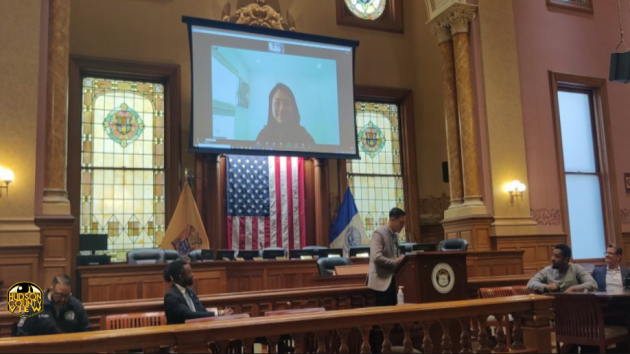420 Cannabis Place Corp. held a Latino cannabis business conference at Jersey City City Hall detailing the emerging industry this morning.
By Daniel Ulloa/Hudson County View
This marked the first annual cannabis conference held by the National Hispanic Cannabis Council’s Tri-State chapter and jointly hosted by 420 Cannabis CEO Osbert Orduna.
While approved by Jersey City, they are waiting on the New Jersey Cannabis Regulatory Commission (NJCRC) for their state conditional license. Many New Jersey cannabis licenses have already been awarded.
“Welcome to Jersey City. Welcome to City Hall. Hoorah Semper Fi,” said Councilman-at-Large Daniel Rivera, also noting it is the last day of Hispanic Heritage Month.
“As a proud Latina member of the Cannabis Regulatory Commission, I bring the values of my community with me to work every day. Every community will benefit from its success,” NJCRC Commissioner Maria Del Cid said virtually.
“Hispanics are constantly underrepresented in business ownership, and cannabis is no exception.”
Del Cid said that under six percent of cannabis licenses are owned by Hispanics, despite being 20 percent of the population of the United States.
“In New Jersey, we’re going to change that,” she declared.
She continued that policies geared to help poor, minority-majority neighborhoods that are Impact Zones and Economically Distressed Areas (EDAs) would help.
“We are holding them to each of the commitments they made,” she said about the licensed dispensaries in the adult-used limited market.
“We need all of u to join in this mission … to transform our communities for the better.”
From there, Orduna said there is a taboo around cannabis in the Hispanic community. He also pointed out that even though cannabis is legal in New Jersey, you can’t consume it in the street.
“Black and Brown communities were disproportionately targeted during cannabis prohibition. To see our communities are a minority percentage is something we should all be upset about,” he said.
“Normally, we’re underrepresented in business ownership. In cannabis, it’s that much more exponential.”
Orduna explained that without skewered statistics, it’s 3.8 percent ownership of Hispanics. He noted there are great opportunities for Hispanics in the nascent industry that will be a multi-billion dollar industry one day.
He further stated that issues with Section 280-E of the IRS tax code, whereby licensed cannabis companies cannot write off their expenses, leaving them with a 70 percent tax rate where most businesses can take advantage of such large loopholes.
“You have less access to capital,” Orduna said about Latino households typically being poorer than the average white household.
He asserted that the negative perception of cannabis is due to “the best misinformation campaign ever launched in this country,” which increased hatred of Hispanics.
“It was pitched as something that would … unleash the Latino hordes and plagues to rape, rob, pillage, and steal, which obviously wasn’t true. This has been going on for 80 years,” Orduna said.
He also advocated for Congress to pass the SAFE Banking Act to increase access to capital for cannabis companies while the plant remains federally illegal.
NJCRC Director of Diversity and Inclusion Wesley McWhite explained that under New Jersey’s cannabis legalization implementation law, the NJ Cannabis Regulatory and Enforcemet Market Modernization Act (CREAMMA), 30 percent of licenses are supposed to go to certified, minority, women, and disabled veterans, and his office oversees that.
McWhite said they, along with other agencies, are working to solve the significant issues of access to capital, real estate, and workforce development.
“We are working very intimately with the Economic Development Authority to unveil an access to capital program sometime soon,” McWhite said.
The EDA has previously said the program to financially aid cannabis companies will open next year.
McWhite said they are also working with the NJ Business Action Center to help entrepreneurs. He explained it is a new program and most states do not have such a program so early in their cannabis markets.
“We’re listening to the public and adjusting as we see fit,” McWhite said about the technical details of their different licenses to operate different businesses.
He indicated they received over 1,300 applications and are reviewing them as quickly as possible, as well as that companies tend to use gamesmanship to get a preferred review to look good on paper.
“Every product that will be sold … has to be tested. So that is an opportunity to get into the testing space,” McWhite said.
He noted they are making good progress at setting up diversely owned businesses.
Out of 1,434 persons of interest who own at least 11.4 percent of a company that applied for a license, 158 are Hispanic, making the New Jersey licensed cannabis industry 11 percent Hispanic-owned.
McWhite noted that, unlike in Jersey City, many municipalities allow very few cannabis companies.
“Our job as the CRC is to continue to dialogue with towns that have not opted in,” he said, also encouraging the public to speak to local leaders about cannabis.
“We still have work to do to make sure other municipalities opt in. We don’t have a strong cannabis community in the advocacy space. The CRC cannot do it alone. We can really fight stigma and fear.”
NJ Hispanic Chamber of Commerce CEO Carlos Medina moderated a panel with Orduna, McWhite, and Rosemarie Moyeno Matos, attorney for the controversial Medusa dispensary and lounge that is currently tied up in litigation.
“Everything costs more in cannabis,” Orduna said, especially real estate.
Matos said that most towns that only allow a few companies have chosen them already, while others that allow many, like Jersey City, are being inundated.
“There are also many financial predators in the industry,” she stated.
Orduna explained a situation this was offered to him by a man who represented owners of many licenses.
“You will be 51 percent owner for three years when you will sell your license. You’ll be well compensated. With six figures. We’ll take care of everything. In three years, we’ll buy you out. You’ll be a one percent owner forever,” he recalled.
“There are people out there who are sharks. They see your woman status, minority status … as someone they want to exploit. They’re going to make you do something illegal. That’s a front.”
To that point, McWhite said they had an investigative team looking for predatory practices.
“That happens to many members of our chamber. If it feels wrong, listen to your gut. You’re right 95 percent of the time,” Medina stated.









